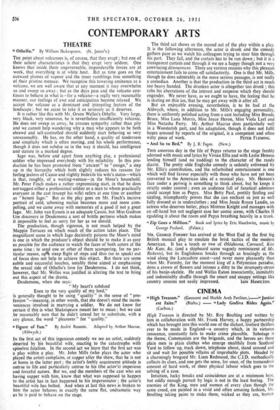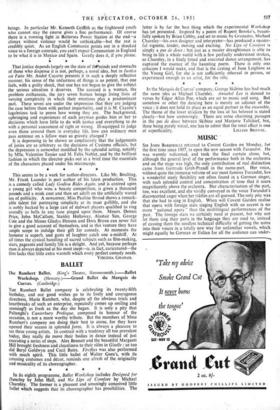CINEMA
"High Treason." (Gaumont and Marble Arch Pavilion.)—" Justice
est Faite." (Rialto.) — “ Lady Godiva Rides Again." (Carlton.) High Treason is directed by Mr. Roy Boulting and written by him in collaboration with Mr. Frank Harvey, a happy partnership which has brought into this world one of the slickest, liveliest thrillers ever to be made, in England—a country which, in its virtuous innocence, constantly fails to make crime plausible. Sabotage is the theme, Communists are the brigands, and the heroes arc those plain men in plain clothes who emerge stealthily from Scotland Yard to follow up, track down, telephone about, stand around and sit and wait for pOssible villains of improbable plots. Headed by a charmingly brogued Mr. Liam Redmond, the C.I.D. methodically collects its clues, and one gets the sense, for once, of the tremendous amount of hard work, of sheer physical labour which goes to the solving of a case. Intuition, lucky breaks and coincidence are at a minimum here, but oddly enough pursuit by logic is not in the least boring. The enemies of the King, men and women of every class 'though the same creed, are painted in a vivid and often amusing fashion, Mr. Boulting taking pains to make them, wicked as •they are, human beings. In particular Mr. Kenneth Griffith as the frightened youth who cannot stay the course gives a fine performance. Of course there is a running fight in Battersea Power Station at the end—a climax without violence would be unthinkable—but the rest is credibly quiet. As an English Communist points out in a shocked voice to a foreign comrade, you can't expect Communism in England to be what it is in Mexico and Spain. Gently does it, if you please.
That justice depends largely on the state of thtininds and stomachs of those who dispense it is not, perhaps, a novel idea, but in Justice est Faite Mr. Andre Cayatte presents it in such a deeply reflective manner, his sense of the unfairness of things is so potent, that one feels, with a guilty shock, that one has not begun to give the subject the serious attention it deserves. The accused is a woman, the problem euthanasia, the jury seven human beings living lives of varying complexity in which their emotions play a predominant part. These seven are under the impression that they are judging the case before them with perfect impartiality, and it is M. Cayatte's lugubrious task to prove how wrong they are. The background, upbringing and experiences of each juryman guides him or her to decisions which have little to do with justice and everything to do with a personal assessment of right or wrong. Ill-equipped to judge even those around them in everyday life, how can ordinary men pass sentence on a fellow man so gravely charged ?
It is depressing to be shown so conclusively that the judgements of juries areas arbitrary as the decisions of Customs officials, but the depression is somewhat modified by the splendid acting, notably by Mlle. Valentine Tessier and M. Felix Noblet, and by the brilliant fashion in which the director picks out in a brief time the essentials of the characters placed under his microscope.
* * * *
This seems to be a week for author-directors. Like Mr. Boulting, Mr. Frank Launder is part author of his latest production. This is a comedy called Lady Godiva Rides Again, and is centred upon a young girl who wins a beauty competition, is given a thousand pounds and a mink coat and then set adrift on ttie artificially waved sea of publicity. A newcomer, Miss Pauline Stroud shows a remark- able talent for portraying simplicity at its most gullible, and she is nobly backed by a large cast of stalwart players qualified to ring soundly as bells to any tune pinged upon them. Messrs. Dennis Price, John McCallum, Stanley Holloway, Alastair Sim, George Cole and the Misses Gladys Henson and Dora Bryan can never fail to give a good account of themselves, and in this venture they have ample scope to indulge their gift for comedy. At moments the humour is superb, and gusts of laughter catch one a-midriff.- At all times the cynical handling of sacred subjects such as film-making, stars, pageants and family life is a delight. And yet, because perhaps man is always depicted at his most inept—is, in fact, caricatured—the film lacks that little extra warmth which every perfect comedy needs.
VIRGINIA GRAHAM.



































 Previous page
Previous page